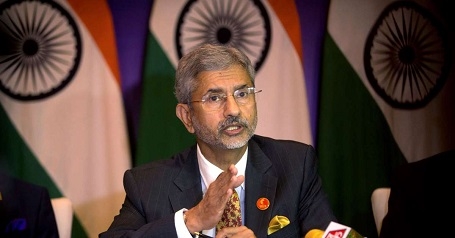DIPLOMACY
| Date :20-Mar-2020 |

EVEN as he goes full distance to explain to the countrymen the meaning of diplomacy, Minister of External Affairs Dr. Subramanian Jaishankar often insists upon futility of jumping to conclusions or offering knee-jerk reactions to small developments. Of course, he does not shrug his shoulders and lets some events pass without any Indian response. But he often insists upon a long-range view of international relations that would forbid India and Indians from assessing a situation with a sense of finality.
For, he does not want to discount the ups and downs in the evolutionary process of dynamic bilateral and multilateral relations. India’s response to the reference to Jammu and Kashmir in a recent joint statement by Chinese President Mr. Xi Jinping and Pakistan President Mr. Arif Alvi, therefore, comes as a customary reaction whose formality is essential to diplomatic considerations. India’s slamming of China and Pakistan for trying to create an issue out of India’s internal matter, thus, is in tune with the larger comprehension of diplomacy as a continuous activity with a bigger goal.
There is no denying the reality of the all-weather friendship China and Pakistan have forged over time. For whatever compulsions and reasons, China has to keep pushing its partnership with Pakistan -- and the reference to Kashmir in the joint statement stemmed from that consideration. By its prompt response to that overture, New Delhi has done well to make its position clear -- that no other country has any business to dabble in India’s internal matter. India often attaches tremendous importance to its ties with China as well as the United States of America.
There has been a qualitative improvement in bilateral relations with both the countries in recent times, thanks to the initiative of informal diplomacy by Prime Minister Mr. Narendra Modi. The three informal summits between Mr. Jinping and Mr. Modi over the past three years have led to a greater clarity of thought and action on both sides. One of the most positive outcomes of these informal summits has been a dramatic and drastic reduction in cross-border incursions by the Chinese troops. There is also yet another twist that must not go unnoticed. In recent times, the repeated Chinese reference to Arunachal Pradesh as its own territory, too, has gone missing in its diplomatic narrative.
This is not a thaw that anybody can miss, an obvious sign of maturation of India’s diplomatic activity and expanding footprint on account of a more sensible handling of the complexity of foreign affairs. It does not require a special genius to realise that the reference to Kashmir in the joint statement by China and Pakistan was at the behest of Islamabad. No matter how powerful China may be in whatever areas, its leadership is not naive enough not to understand the strong and unalterable Indian position on Kashmir -- on grounds of strategy, security and international realpolitik. Viewed against these realities, the reference to Kashmir in China-Pakistan joint statement has only a customary value into which there is no need to read something non-existent. Pakistan, for sure, will never try to understand the reality and will keep harping on Kashmir, which is the compulsion of its foreign policy.
In fact, Pakistan suffers from an absolute poverty of intellectual prowess to position itself properly and make itself relevant to international complexities. Over time, it has run out of ideas that would keep its foot in the door. The reference to Kashmir in joint statement, therefore, should be seen as an expression of Islamabad’s abject intellectual poverty. China’s case is altogether different, and its joining hands with Pakistan is nothing more than a diplomatic imperative whose motions have to be gone through to keep some things going, as part of its habitual mischief-mongering.
